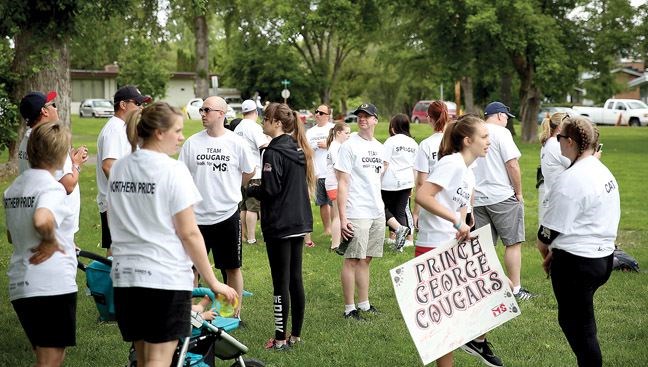Penny Brown didn't know what multiple sclerosis was until she was diagnosed five years ago.
"It strikes people differently," said the 58-year-old, who helped organize Sunday's Scotiabank MS Walk to raise money for people suffering from the incurable disease.
MS attacks the central nervous system and the brain's ability to communicate function. It can damage vision, create numbness, challenge coordination and balance, give bladder and bowel problems, stiffen muscles or paralyze body parts. For some, that means using wheelchairs or walkers but for others, like Brown, it can seem invisible.
"Take a look around, you don't know who has MS," said Brown after the walk at Fort George Park.
Canada has one of the highest rate of multiple sclerosis in the world. That translates to an estimated 93,000 across the country, according to 2011 Statistics Canada data.
The Prince George chapter of the Multiple Sclerosis Society of Canada raised more than $30,000.
"This all stays local," said Brown of the funds, which will be used by to help with equipment and accessibility aids.
Twice as many women are diagnosed and ages 15 to 40 are most common for onset.
On Sunday 169 walkers and 30 volunteers came to the annual event, which was also held in 160 communities across the country
That support is important, said Ann Bozoki.
"It means I'm not alone anymore," said Bozoki, who was diagnosed in 2008. "It means that there are more people who are willing to try and understand what we're going through and that means that there are people out there making an effort to make the world as a whole more accessible."
Getting around Prince George can be difficult, she said, describing it as a city of stairs. And it's more than those with MS who face mobility issues.
A little bit of awareness around accessibility can lead to small but helpful changes.
Keeping an aisle in a grocery store clear, for example. It can be difficult to turn a scooter around. But Bozoki's careful to note people should understand that ability isn't obvious.
Some may not look like they need that preferred parking spot, but rely on that extra bit of help.
For Bozoki, MS has manifested in different ways.
She's lost feeling in her legs, but that has returned. She tires often and has to plan her day: "Spontaneity doesn't happen a lot."
Sometimes she experiences what she calls "flare-ups," which kept her from completing the event's full walking route.
"The soles of my feet constantly feel like I'm walking on burning sand," she said, but she also knows she needs to keep herself in motion as much as she can.
"Movement is so important for somebody who's losing it," she said. "The more I exercise that I get the slower I will lose things."
Bozoki, 48, grew up with a mother who had MS, but even that didn't prepare her.
"I thought I knew. But until you're the one sitting on that chair, you don't," said Bozoki, whose doctor estimates she had the disease about 15 years before diagnosis.
"The earlier the diagnosis, the better chance they have of holding on to what they've got," said Bozoki, adding education is essential.
She has her explanation to those ignorant of MS down to a simple description:
The disease attacks the insulating cover - called myelin - that protects the body's nerves. Bozoki compared myelin to the rubber protecting an electrical cord.
"When that rubber is gone, that will now short circuit what happens when you're trying to send electricity to your plug and your appliance," she said.
"Your brain tells you to scratch your nose but it only has to tell you once. My brain might have to tell my hand five or 10 times."
For Joann Smiley, community services coordinator at the society, the group's goal is to provide education and support to make life easier.
It's why she got involved with the society in the first place - for a friend who had MS.
"If I could change his life for one day or make things better even for one day, it's worth it."



